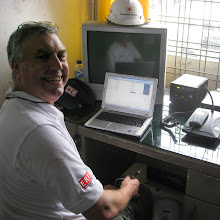On Wednesday we took a coastal passenger ship to an island in the delta to visit three radio sites at cyclone shelters. When we arrived at the dock we used motorcycles to get around the island since there are no roads, only dirt tracks on top of levees that keep the salt water from the ocean out of the fields. Not only are there no roads there is no electricity as we know it, and no running water. Solar panels provide DC electricity, if you're lucky enough to own one, and the water comes from the community well. The people live a simple existence very close to nature. The land is totally flat and probably no more that one or two feet above sea level. The levees are critical. It's easy to appreciate the devastation of a tropical cyclone and the flooding that occurs each monsoon season.
In true Bangladesh fashion we had three people on each motorcycle and I became the meat in the proverbial sandwich between the driver and my colleague Hasan. Not the most comfortable way to ride but it got us where we needed to go.
Just after we left the third site the motorcycle's rear tire went flat … one American + two Bangladeshi's was probably too much. As we waited for a replacement bike a crowd gathered as it always does around westerners on these islands. It was mostly young high school boys on a break. They stood and stared, so I said “Hello”. Hasan explained who I was and why I was near their village. I asked if they had any questions about America and they got shy when put on the spot. At that moment a young man, probably late twenties or thirties, wearing nothing but a sarong, probably a farmer, asked a long question which boiled down to, “Why does America keep forcing itself on other countries and is so heavily involved in Iraq and Afghanistan?”. Not what I was expecting - and not an easy question to answer. Hasan explained to me that even though these people live a simple life, disconnected from the world as we know it, they definitely know what's going on ... and have an opinion.
Yesterday I had a day on the “SS Unreliable”. We chartered a wooden boat to take us down river to two islands to visit three more radio sites at cyclone shelters. Half way down river the engine quit. It took about 15 minutes but the captain got it running and we headed for the first island. As we approached shore I could see no dock or pier of any kind so the captain headed the boat in towards the river bank. Unfortunately the tide was low so he couldn't get close. Some fishermen pointed out a small inlet and we headed in and managed to get within two feet of a log that we used to get ashore. From there we walked about ½ mile into a village and found the cyclone shelter. After checking out the radio (the coax cable was perfectly cut in two when they moved to this building a month ago) we attended a meeting of all the village men so my compatriots could explain why we were there and to listen to requests for additional equipment.
Back on the boat we attempted to leave but got stuck in the mud twice before finally escaping back into the river. At times we had two people on a long pole and the captain in the water pushing. This whole episode gave great delight to a group of small boys watching from the bank. Once underway we crossed the river without incident and pulled up along shore so we could hop off and visit two more shelters. This time I had a motorcycle to myself!! After tea and a very late lunch at the second village we headed back to the boat. As is typical, a huge crowd gathered in the village as we settled up for the motorcycles and had another cup of tea. Most of the crowd accompanied us down to the boat to see us off. The tide had fallen by now so we now had to walk about 10 yards across a very muddy and slippery river bank to get aboard.
We headed back to home port and got about a quarter mile from the dock when the engine died yet again. This time it appeared to be a bit more serious as the captain had his mate lower an anchor. So there we sat as the dusk came and went. We had called ashore for a boat to come and get us and while we waited the captain finally cleared a blockage in the fuel line and we made it in without further incident. As part of the routine we had a cup of tea and a crowd formed as we settled up for the boat. A short ride back in to Golachipa in the Land Cruiser and our day was done!!
Subscribe to:
Post Comments (Atom)


No comments:
Post a Comment